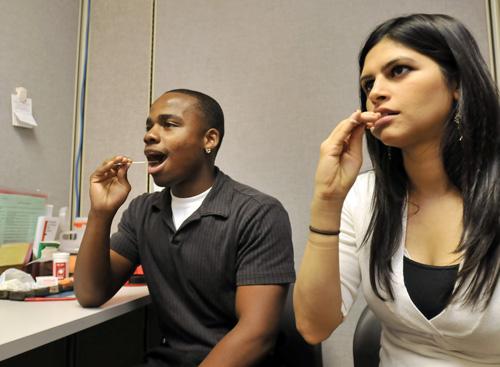UI professor creates fund for lymphoma researchers

Darnell Leatherwood, left, sophomore in Business, and Zenobia Ravji, graduate student, demonstrate how to do a mouth swab to reg
September 25, 2008
Parents deal with losing a child in different ways.
University professor Fred Gottheil decided raising nearly $1 million and adding names to the bone marrow registry was an outlet for his grief.
Gottheil, professor of economics, and his wife lost their 19-year-old son Josh to lymphoma in 1989.
Josh went through chemotherapy, radiation and even a bone marrow transplant from his mother. The Gottheil family spent five months at Barne Hospital in St. Louis before their son’s death.
“I didn’t know what to do with myself,” Gottheil said. “I said, ‘I’m going to create something to honor the nurses that worked so hard to keep my son alive.'”
Get The Daily Illini in your inbox!
Out of that wish, Josh’s Fund was created. The Josh Gottheil Memorial Fund for Lymphoma Research is a nonprofit organization that raises money to provide grants and educational opportunities for the Oncology Nurses Society.
“They (nurses) are really remarkable,” Gottheil said. “It takes a certain personality to do it. They are the soldiers in the trench, 24 hours a day in the battle against cancer.”
Every penny raised by Josh’s Fund goes directly to the Oncology Nurses Society. There are no overhead costs or administration fees and the fund is totally tax exempt.
“When I ask someone for money I want the person who gave me $1 to know that their $1 is going for the cause.”
Another facet of Josh’s Fund is to educate people about signing up for the bone marrow donor registry.
“The more people on the registry, the more likely that someone will find a match,” said Ashley Davidson, donor relations coordinator for Community Blood Services of Illinois.
A good bone marrow match comes from within the family, if possible. But if that is not possible then it is easiest to get a match from the same ethnic group.
People only have a 30 percent chance of finding a match within their own families, Davidson explained. So for the rest of the matches doctors have to turn to the marrow program for help.
“Cancer doesn’t pick and choose; it’s random,” Gottheil said.
Bone marrow transplant is a last resort for most patients because chemotherapy and other methods of treatment are not working, Davidson said.
“You have the possibility to save someone’s life,” said Davidson.
Josh’s Fund and Community Blood Services of Illinois are registering students and community members Thursday from 2 to 6 p.m. at the Trelease Dining Hall at Florida Avenue Residence Halls. Registering is free of charge at this event and the entire process takes less than 20 minutes.
Students that sign up for the registry are not guaranteeing that they will actually have to donate for someone, but putting their information out there just in case.
To register, students do not need to draw blood, just swab cheek particles from their mouth, she added.
“If there’s a kid that needs bone marrow, I want that kid to get a chance to live,” Gottheil said.
It is more difficult for minorities to find a bone marrow match because so few minorities are registered, Davidson explained. Out of approximately 11 million donors globally, blacks make up less than 500,000 donors registered in the national marrow donor program,
“I just want to get more people involved so that people with cancer and minorities with cancer have a better chance of staying alive,” Gottheil said. “If one person registers, then it’s one more than we ever had before. Everything counts.”
Darnell Leatherwood, sophomore in Business, is also helping set up the registry drive.
Leatherwood said he first heard about Josh’s Fund when he was a student in Gottheil’s economics class and wanted to get involved because he had also lost someone close to him from bone marrow disease.
“We talked about the ways to help the cause, I just wanted to do something to help,” Leatherwood said. “We as people should always come together and try to support each other. If we don’t help each other then who’s going to?”
Anyone in generally good health and between the ages of 18 and 60 years old is eligible to register, Davidson said.
“If you are thinking about your life and thinking, ‘Well I didn’t do much, I didn’t pass my classes or do anything great. But I saved a life,’ Well that’s pretty great. You’re going to heaven,” Gottheil said.






